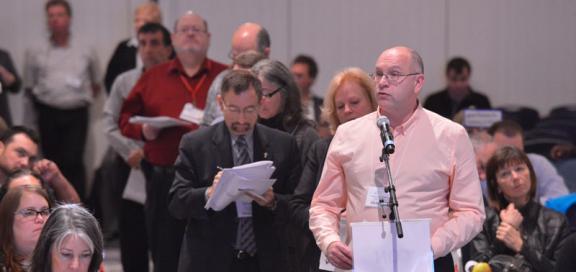The debate on policy resolutions at MoveUP convention saw many members, including a significant number of first-time delegates, coming up to speak at the mics.
The first resolution that was debated and passed committed MoveUP to support provincial changes the improve protection for domestic workers and live-in caregivers. Women’s Committee Co-Chair Susan Orr pointed out that domestic workers and live-in caregivers are often in an extremely vulnerable work situation given because they live in their employers’ homes and are sometimes unaware of their employment rights.
Resolution 2 proposed that MoveUP lobby the BC government to amend the Employment Standards Act to protect victims of domestic violence from retaliation by employers if they take time off to seek medical attention, counseling, or other related services.
“Not only will this help our own members who are affected by domestic violence, it will also affect all British Columbians who may not have the benefit of a collective agreement," said one delegate at the mic. This resolution was referred back to committee so the resolution could be amended to include a requirement to call on the Alberta government as well.
The next resolution, which was also passed, proposed implementing a tracking process to ensure resolutions passed at convention are implemented. The passed resolution requires a process that will include reporting on the implementation of resolutions to the board, council, and local membership.
The passing of the next resolution (4) occurred to ensure that new job stewards will receive steward orientation for their specific collective agreement within 3 months of being approved as a steward.
“We provide training in how to be a job steward. We don’t provide training in what the collective agreement says, how it is interpreted,” pointed out one member, explaining why this resolution was needed.
A new delegate from ICBC added her voice in support and recounted her experience as a new member: “I didn’t have much knowledge about unions until I experienced a personal challenge myself…I was so afraid of losing my job. I didn’t know I had this kind of protection. The union environment is so nice that coworkers are like brothers and sisters.”
The most debated resolution of the day was the fifth and final on the agenda, which would require bargaining committees to be elected by secret ballot by bargaining unit members from Executive Councillors and Job Stewards, in absence of an Executive Board Member. This would mean Executive Councillors would not be automatically appointed to the bargaining committee.
“It’s engaging our members so they feel they have a voice, listening to what our members want and trusting that when they elect a bargaining committee they’ve elected the best voices to represent them at the bargaining table,” said one delegate in support of the resolution.
“You need to have that councillor who hears what’s going on in the labour movement working at that bargaining table…you need to have that continuity,” commented another member in opposition.
In the end the resolution was referred back to committee with a request that they amend the resolution to take into account the differing needs and dynamics of smaller and larger units.
After the policy debate, convention returned to the outstanding proposed constitutional amendments. As on Thursday, most of these were housekeeping items.
“Since we declared autonomy from the international union we had to change our constitution numerous times…we found that there were a lot of things left hanging that didn’t apply or weren’t clear or concise anymore,” explained President David Black.
One example of a procedural clarification was the amendment that will mean all votes around ratification of a collective agreement, strike votes, or matters requiring referendum pursuant to the constitution and by-laws will be conducted by secret ballot. Other amendments clarified procedures around charging organizing fees, election and nomination timing, and calling a special covention.
Further wording changes specified what happens if members suffer salary loss due to a third-party picket line and there is insufficient money in the Defense Fund to cover the losses. In that case, the Board could impose an assessment so that members share more fairly in the losses.
Another amendment passed allows a majority of Executive Council members to request the President call a special meeting – a privilege previously only granted to the Executive Board.
In addition, criteria was outlined for nominating candidates for Vice-President, giving more time to the nomination window and allowing nominations to be made by a minimum of two Job Stewards, Executive Councilors, or Board Members from the relevant Vice-Presidential area. Another amendment allows nominated VP candidates to have the list of their constituents who are registered for convention.
One amendment was referred back to committee to consider allowing candidates to submit longer personal profiles during election time. All the other constitution and bylaw changes were passed.



